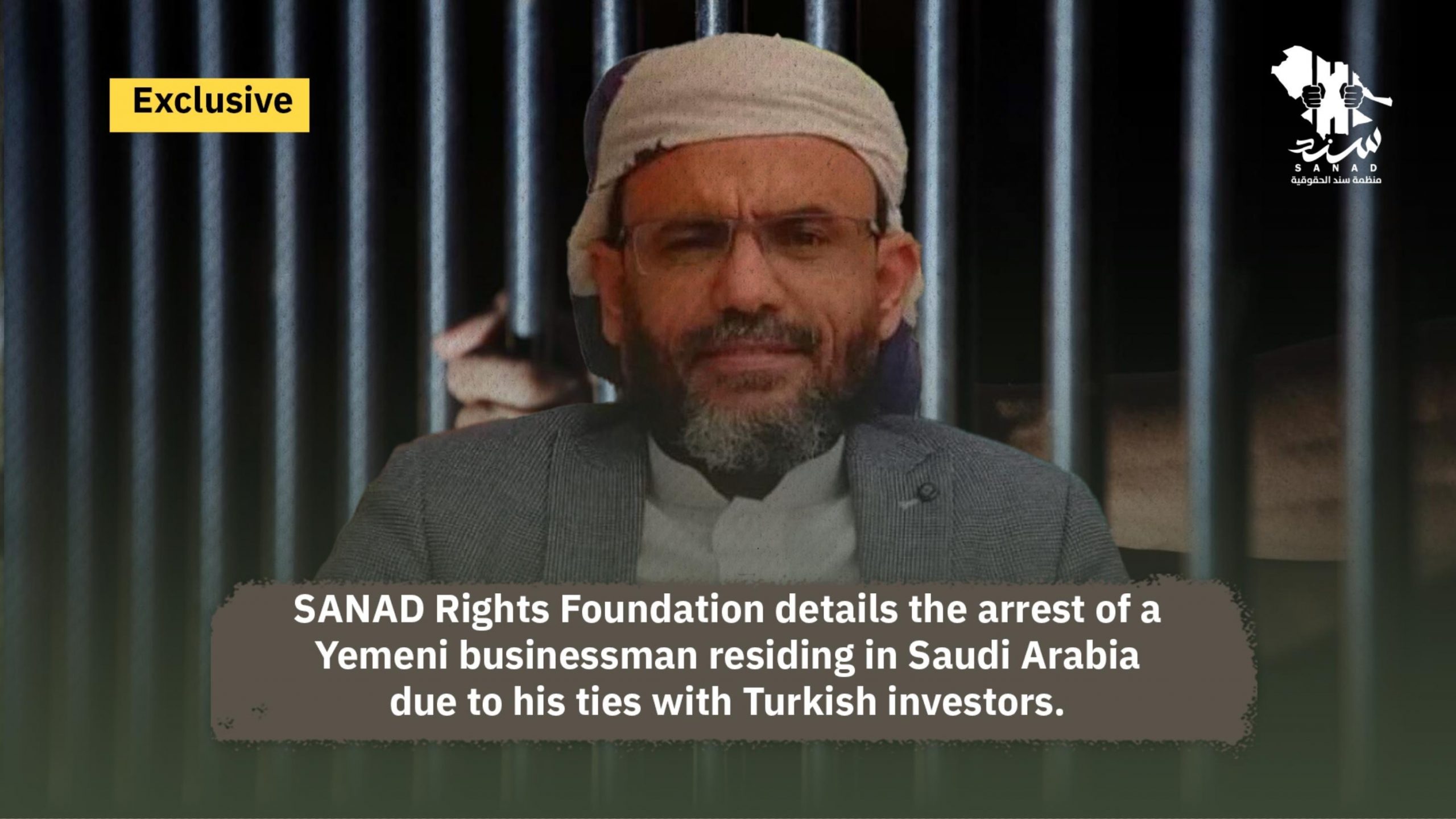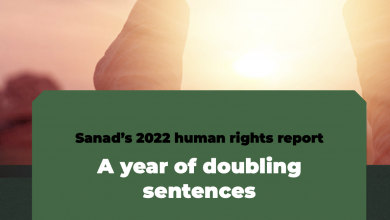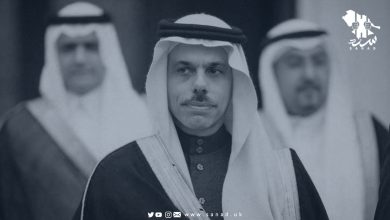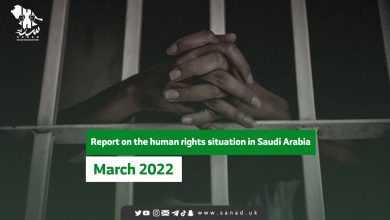
Exclusive! SANAD Rights Foundationdetails the arrest of a Yemeni businessman residing in Saudi Arabia due to his ties with Turkish investors.
Exclusive! SANAD Rights Foundationdetails the arrest of a Yemeni businessman residing in Saudi Arabia due to his ties with Turkish investors.
SANAD Rights Foundation obtained a secret document regarding the trial of the detainee Muhammad Mutahar Muhammad Fadayel, a Yemeni national. The document discloses the list of lawsuits filed against Fadayel, as well as the evidence used by the Public Prosecution to support its claim and the methods of torture he was subjected to during the investigation in order to coerce him into confessing to alleged criminal offences.
About the detainee
Muhammed Motahar Muhammed Fadayel, a Yemeni businessman and tribal sheikh, was well-known for his support of the governing regime in Saudi Arabia, where he has resided since 2014 following events in Yemen at the time. He engaged in numerous commercial endeavours in Saudi Arabia and Turkey. The Yemeni government relied on him for the reformation and resolution of tribal disputes. He was also known for his staunch opposition to the “Houthi movement” (officially known as Ansar Allah, the “Houthis”). A number of his relatives were slain at the southern border of Saudi Arabia in retaliation against the Houthis. On June 28, 2020, the Saudi authorities arrested him at his residence and confiscated his phones and personal devices. He has since been convicted and sentenced to 27 years in prison.
The list of accusations
The document, obtained exclusively by SANAD Rights Foundation, discloses the lawsuit filed by the Public Prosecution against the detainee, which was changed multiple times after three trial sessions. Although the Public Prosecution filed a statement of claim in the first three sessions, it was subsequently withdrawn and replaced.
The first statement of claim, submitted by the Public Prosecutor (Imad bin Muhammad Al-Tuwaijri), stated, “Muhammad Fadayel’s association with suspicious persons and leaders of political parties and organisations hostile to the Saudi Kingdom.” This included journalistsandintelligence personnel in Turkey through his communication with Mr. Yassin Aktay, an advisor to the Turkish President.In addition, Fadayel’s support for The Society of Muslim Brothers and his glorification of its members, as well as his affiliation with the Al-Qaeda organisation, are among the accusations included on the list. However, no specific reference to any statement by him was cited.
However, this list was removed and a new case file was submitted, in which he was accused of supporting the “Houthi movement”. The contradiction in the list is not hidden, as the detainee has been accused of supporting contradictory entities, although he was clearly anti-Houthi, as previously indicated.
According to the document, the Public Prosecution relied on Fadayel’s participation in a conference that drew together a number of investors in Turkey to convict him. He had attended the conference in his capacity as an investor. This conference was attended by the advisor to the Turkish president, Yasin Aktay, and a photo was taken with him. On his phone, there was a video of Turkish President Recep Tayyip Erdogan with remarks glorifying and praising him, a photograph of the late Egyptian President Muhammad Morsi, and a photograph of al-Qaeda leader Osama bin Laden. In addition to keeping a derogatory image of Saudi King Salman bin Abdulaziz and the former Crown Prince of the United Arab Emirates, Muhammad bin Zayed, and a picture of a conversation in a WhatsApp group (called “Yemeni Developments No. 1”). In contrast, the Public Prosecution determined that Fadayelsupports the Houthi movement based on a Facebook account bearing the name Muhammed Motahar Muhammed Fadayel, despite the fact that the accused refuted that the account is his. The authorities examined the devices he used and failed to establish the ownership of the account.
Defendant’s petition
The document obtained by SANAD revealed that the accused has denied the charges. His encounter with Yasin Aktay, advisor to the Turkish president, occurred after he became a victim of fraud in Turkey, in which he lost $1.5 million. He sought assistance from Aktay, as chairman of the investors in Turkey. Other than the collective messages he received from Yasin Aktay, to which he did not respond, there was no communication. According to the document, Fadayelattempted to contact Aktay, but his calls went unanswered.
Regarding the Public Prosecution’s allegation that Fadayelkept offensive images of King Salman, the former Crown Prince of Abu Dhabi, Mohammed bin Zayed, and the leader of Al-Qaeda, the accused denied direct intent. He asserted that it was automatically transferred to his phone, along with hundreds of clips and images that are stored on his phone as a result of using WhatsApp. In other words, this cannot be considered evidence that requires him to be charged with the alleged offence.
The Public Prosecution demands
Despite a lack of substantial evidence, the Public Prosecution demanded that he be sentenced to the maximum penalty stipulated in Item A-44 of the Saudi system, which includes a sentence of between three and twenty years for anyone whose affiliation with extremists is proven. In addition, the Public Prosecution demanded that he be sentenced to a severe and disciplinary punishment intended to deter others, as well as a travel prohibition.
The court’s decision
According to the document received, the Specialised Criminal Court sentenced him to seven years in prison on the basis of the charges brought by the Public Prosecution. Although the court acknowledged the incorrect ownership of the account showing support for the Houthi movement, it still accepted the charge against him. Fadayel denied supporting the Hezbollah group in Lebanon, which was an additional allegation added by the court that had not been included by the Public Prosecution. He emphasised that this accusation was never brought against him in Mecca, Jeddah, or Riyadh, and that the court inserted it without evidence or legal justification.
The Public Prosecution appealed the verdict, arguing that (7 years) it was not enough. Muhammad Fadayel also filed an appeal, expressing astonishment at his conviction on charges that cannot be brought against him. The Court of Appeal, however, disregarded his appeal and increased his sentence to 27 years.
Illegal arrest
The document obtained by SANAD also revealed that Fadayelwas subjected to abuse during his arrest by the security services. They arrested him without legal documentation and searched his house without a warrant, as well as storminghis house and terrorising his family.
Torture in prison
It also revealed that he was subjected to systematic methods of torture within the prison, where he was beaten on the head, stomach, and feet in order to elicit two confessions from him under duress. He was held in solitary confinement for four months and twenty days, unable to communicate with his family and children in Turkey. Additionally, the court refused to appoint his brother to represent him in the Turkish court, resulting in significant losses to his investments in Turkey.
Member of SANAD Advisory Board, Dr Sue Conlan, said: “The charges brought against Muhammad Fadayel demonstrate the absurdity and the lengths that the Saudi regime will go to in order to control the lives of people within the country. The lack of evidence and the clear contradictions in the accusations against him, together with the use of torture to extract confessions, show a regime that has no regard for the rule of law. This is the real face of the Saudi regime in contrast to its attempts to portray itself as an open society”.
Illegal promotions
Imad bin Muhammad Al-Tuwaijri, Abdullah bin Abdul Rahman Al-Dakhini, and Muhammad bin Abdulaziz Al-Farhoud, three of the Public Prosecution employees who testified against Fadayel, were appointed to the Specialised Criminal Court as judges. In addition, Rashid bin Abdullah bin Rashid Al-Habashan, Tariq bin Ibrahim Al-Hazani, and Imran bin Ahmed bin Abu Bakr Musa have maintained their positions within the Public Prosecution. In the same context, the Public Prosecution demanded that two of the judges in his case be executed on allegations of high treason, they are Abdullah bin Khaled Al-Luhaidanand Abdel Aziz Bin Fahd Al-Dawood.






